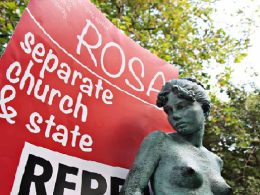At a ROSA meeting in October, Igor Iasine as guest speaker spoke about his first hand experience of LGBT repression in Russia, and the CWI’s campaign against this. Igor is active in Moscow, both in the LGBT movement, and in the Socialist Party’s sister organisation, the Russian section of the CWI. In this year, he has been physically attacked twice because of his activities.
The situation in Russia is dire. Various far right groups break up publicly advertised LGBT meetings. The police stand idle, even as LGBT rights activists are beaten before their eyes, and thus “learning to defend ourselves is an important skill,” Igor told us. Some of these reactionary groups have organised networks where they find LGBT teenagers on facebook, particularly in small towns. They intercept these youths, and publicly humiliate and beat them, uploading videos of this savagery on the internet.
The Russian government has cynically used these homophobic sentiments to their advantage, using LGBT people as convenient scapegoats as a cover for their regressive social and economic policies. Putin signed a new law that bans “propaganda of non-traditional sexual relations to minors,” a loose definition that will effectively outlaw LGBT rights activism. Although not yet put in force, the law has justified and fuelled further violence against LGBT individuals and organisations by the far right.
However, there may be light at the end of the tunnel. “The situation is bad, but not hopeless. I’m optimistic” Igor said. He was even surprised by the amount of support the movement did receive. “We have to appeal to the Russian working class, and not to the state or foreign countries,” he said. The CWI, along with teachers, and the car workers’ union have already publicly spoken out against Russia’s homophobic laws. Although a majority of Russians still support the law currently, Igor explains that efforts must be taken to clear these misconceptions and prejudices. There is hope that the attitude of Russian society towards LGBT rights may well progress as has happened elsewhere.












